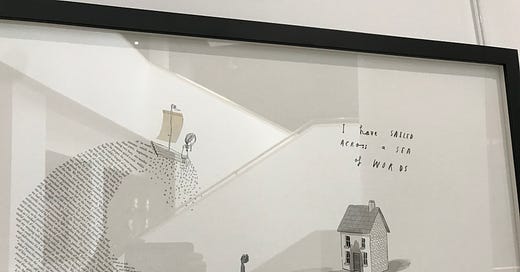Do you hold an opinion on an important topic? Do you believe it to your core? Do you know that you’re right?
Photo taken in 2019 and I have no idea where (please credit the artist if you can!)
Wrong.
Being right is a privilege, usually with the benefit of hindsight. Very few of us have the ability or the judgement to be right in that moment when we first encounter a new idea or piece of information. Not that many folk have the humility to admit that their initial view might be wrong and so they build a fortress around their first opinion on the matter and they’re destined to defend it – forever.
We’re all constructed by the experiences in our life, our biology and how that interacts with the world, and the people around us. Yes, yes, we are – now put the disinterpretation frame on that statement and see how it feels... is my opinion the same as yours and am I right? Are you willing to step into that fortress and never come out, even if new information comes to light?
Increasingly, we’re also influenced by our access to technology and how it is enabling disinterpretation. Much as I’d like to claim that I’m the first to coin that phrase, I’m not. Sergio Santos (2021) beat me to it, something I only realised after I wrote this article and then did a DuckDuckGo search for it. Unlike Santos, I’m using the term in a particularly loaded manner, partly to explore the point, partly to be provocative (all part of a rounded argument even if thinking the unthinkable is, well, unthinkable). Disinterpretation is our arrogant position that there is only one way to understand a situation or concept – our understanding. To satiate this understanding, we will deliberately skew contradictory information to suit whatever comfortable narrative we’ve constructed, based on a plethora of existing narratives that make us who we are. Anything that threatens to disrupt our comfort blanket of understanding is put through the disinterpretation lens (yes, I put a metaphor in the blender, right there) to make sure we can cope with the onslaught of new and potentially threatening information, if our lizard brain is to be believed.
Gotta love a lizard
We’ve all been there.
Bumbling along, with a comfortable set of beliefs in place, when we suddenly come up against someone who has opinions that are just plain nonsense. A liberal who is arguing for the rights of women to choose to be sex workers, a neoliberal politician who wants a functioning health care system, a homeowner who doesn’t want new houses built to spoil their view. We can’t see how their belief system makes any sense in the world we inhabit. Why can’t they see the obvious mistake in their thinking?
We’re complex and contradictory beasts.
As a feminist of many scars, I’m finding myself butting heads with other feminists at an alarming rate these days. It appears that old battlegrounds are reopening under the guise of liberalism and progressive intersectionality. Bring it on. Bring on the conversations and challenges that make us all stronger, more thoughtful, more compassionate. Bring on thinking that includes, rather than excludes, thinking that keeps women safe and expands the possibilities of their lives. But don’t fool yourself that disinterpreting a complex and uncomfortable topic to fit with your existing narrative is going to help anyone. And certainly don’t think that shouting about it on social media is going to help anyone, least of all the people you purport to be supporting.
I’ve decided that my brand of feminism should be called ‘deluded feminism’ because I truly thought women wanted better in the world, for everyone, and understood that the lived experiences of women in different cultures and times is equally valid and worthy of inclusion. My first dystopian novel, ‘The Tally’ (sign up as a paid subscriber for first dibs on a preview copy) tackles these thorny issues of contested realities in a female-led world.
Allowing women to find their voice has always been at the core of much of my writing, even when that voice disagrees with the accepted norms of society. I can now see how the disinterpretists might find that difficult.
So, this is a plea.
Try to approach every situation in neutral. Information is always a set of loaded dice that we roll based on the win we want. But that means someone has to lose. Maybe if we took it in turns to roll and shared the winnings, we could interpret the world together to achieve a greater understanding rather than disinterpreting it to match our existing notions of what is right and wrong.
Accepting that we have a tendency to disinterpret will deal with that gristly critter called confirmation bias and its equally gnarly friend, cognitive dissonance. Acknowledging that we all possess partial and flawed interpretations of the world will feel like crumbs in your bra and grit in your eye at first. That’s okay.
We can be uncomfortable together.






This really resonated with me, Bev. I'm a life time student of yoga (a non-teaching Vajrasati instructor even) and what you're discussing here is one of the core philosophies: to meet the world empty, entirely free of your own emotions, fears, patterns and preconceptions. Especially the ones we are unaware of. It's a life-time endeavour, but every moment presents a new opportunity. To listen, without judgement. 🤓